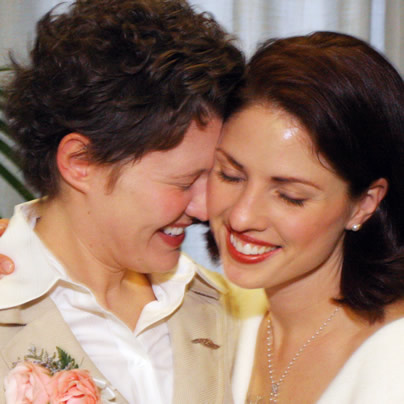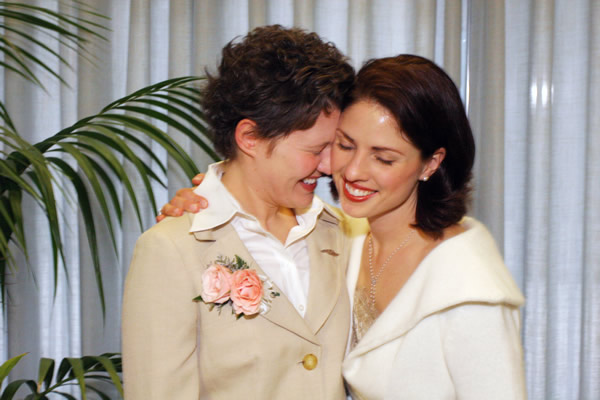Politics
Court rules lesbian widow must receive survivor’s benefits
Decision invokes DOMA ruling, Ill. civil union law in reasoning


Sarah Ellyn Farley and Jennifer Tobits. (Photo courtesy of the National Center for Lesbian Rights)
A federal court has determined that a lesbian widow is entitled to her late spouse’s benefits partly on the basis that Illinois civil union law is sufficient for federal purposes — a view that differs from the Obama administration’s interpretation of the Supreme Court ruling against the Defense of Marriage Act.
On Monday, the U.S. District Court for the Eastern District of Pennsylvania ruled in a 12-page unsigned decision that Jean Tobits is entitled to survivor’s benefits under the Employee Retirement Income Security Act, or ERISA, following the death of her spouse, Sarah Ellyn Farley, who died of cancer in 2010.
“Windsor makes clear that where a state has recognized a marriage as valid, the United States Constitution requires that the federal laws and regulations of this country acknowledge that marriage,” the decision states. “In light of that, this Court finds that Ms. Tobits is Ms. Farley’s ‘Spouse’ pursuant to the terms of the Plan.”
The lawsuit, known as O’Connor v. Tobits, came about in 2011 as the result of Cozen O’ Connor PC, the law firm where Farley worked, filing an interpleader action. Both Tobits and Farley’s parents, who didn’t recognize the marriage of her lesbian daughter, requested payment of the Pre-Retirement Survivor Annuity after Farley’s death that was available under the firm’s profit sharing plan.
Among those saying that Tobits had a right to the benefits and not Farley’s parents was the National Center for Lesbian Rights, which filed a brief on behalf of Tobits in 2011.
Chris Stoll, a senior staff attorney at NCLR, praised the court for its ruling and said it had implications for employers nationwide.
“This is not just a vindication for Jennifer, it is a tremendous victory for every married same-sex couple,” Stoll said. “Employers will no longer be able to hide behind DOMA to avoid providing equal retirement benefits to the same-sex spouses of their employees.”
In the aftermath of the ruling striking down Section 3 of DOMA by the Supreme Court, which determined plaintiff Edith Windsor had a legal marriage because she legally wed Thea Spyer in Canada, the district court determined Tobits and Farley had a legal marriage recognized under federal law because they also married in Canada in 2006.
But the district court buttressed its reasoning by noting that the couple lives in Illinois, which has civil unions, but not same-sex marriage. The ruling notes in a footnote that under state law, Illinois can recognize same-sex marriages solemnized in other jurisdictions as civil unions.
“Indeed, because the Illinois probate Court recognized Ms. Tobits as the sole heir to a civil union, it accepted as valid the marriage between Ms. Tobits and Ms. Farley that took place in Canada in 2006,” the ruling states. “This Court takes judicial notice of these decisions as bearing a direct relation to matters at issue before this Court.”
Doug NeJaime, a gay law professor at the University of California, Irvine, took particular note of the incorporation of Illinois civil unions law into its reasoning.
“The interesting thing here is that the court finds support for the inclusion of the same-sex spouse based on the couple’s domicile being Illinois, a civil union state,” NeJaime said. “In this sense, the court is suggesting that because civil union statutes give those in civil unions the rights of spouses, that is enough for federal purposes as well.”
That interpretation is different from what the Obama administration has reasoned with regarding civil unions in the aftermath of the Supreme Court ruling against DOMA. The U.S. Office of Personnel Management has determined that gay federal employees must enter into a same-sex marriage to receive benefits for their spouses. Those in civil unions or domestic partnerships aren’t eligible.
NeJaime said the reasoning in the decision could place the court at odds with the Obama administration.
“The court is saying that the couple with a marriage from Canada residing in Illinois should be treated like spouses, but this does lead to the potential conclusion that those in civil unions in general should be treated like spouses,” NeJaime said.
NCLR’s Stoll acknowledged the court took note of the civil union law, but said it bases most of its reasoning on Tobits and Farley’s marriage in Canada.
“The judge noted that Illinois respected their relationship and gave them all of the same rights and benefits as other married couples, but his ruling does not appear to depend on that fact,” Stoll said. “A couple that was married in any jurisdiction that allows it should be treated the same as any other married couple for purposes of federally mandated employee benefits, regardless of where they live.”
Congress
Congress passes ‘Big, Beautiful Bill’ with massive cuts to health insurance coverage
Roughly 1.8 million LGBTQ Americans rely on Medicaid

The “Big, Beautiful Bill” heads to President Donald Trump’s desk following the vote by the Republican majority in the U.S. House of Representatives Thursday, which saw two nays from GOP members and unified opposition from the entire Democratic caucus.
To partially offset the cost of tax breaks that disproportionately favor the wealthy, the bill contains massive cuts to Medicaid and social safety net programs like food assistance for the poor while adding a projected $3.3 billion to the deficit.
Policy wise, the signature legislation of Trump’s second term rolls back clean energy tax credits passed under the Biden-Harris administration while beefing up funding for defense and border security.
Roughly 13 percent of LGBTQ adults in the U.S., about 1.8 million people, rely on Medicaid as their primary health insurer, compared to seven percent of non-LGBTQ adults, according to the UCLA School of Law’s Williams Institute think tank on sexual orientation and gender identities.
In total, the Congressional Budget Office estimates the cuts will cause more than 10 million Americans to lose their coverage under Medicaid and anywhere from three to five million to lose their care under Affordable Care Act marketplace plans.
A number of Republicans in the House and Senate opposed the bill reasoning that they might face political consequences for taking away access to healthcare for, particularly, low-income Americans who rely on Medicaid. Poorer voters flocked to Trump in last year’s presidential election, exit polls show.
A provision that would have blocked the use of federal funds to reimburse medical care for transgender youth was blocked by the Senate Parliamentarian and ultimately struck from the legislation — reportedly after the first trans member of Congress, U.S. Rep. Sarah McBride (D-Del.) and the first lesbian U.S. senator, Tammy Baldwin (D-Wis.), shored up unified opposition to the proposal among Congressional Democrats.
Congress
Ritchie Torres says he is unlikely to run for NY governor
One poll showed gay Democratic congressman nearly tied with Kathy Hochul

Gay Democratic Congressman Ritchie Torres of New York is unlikely to challenge New York Gov. Kathy Hochul (D) in the state’s next gubernatorial race, he said during an appearance Wednesday on MSNBC’s “Morning Joe.”
“I’m unlikely to run for governor,” he said. ““I feel like the assault that we’ve seen on the social safety net in the Bronx is so unprecedented. It’s so overwhelming that I’m going to keep my focus on Washington, D.C.”
Torres and Hochul were nearly tied in a poll this spring of likely Democratic voters in New York City, fueling speculation that the congressman might run. A Siena College poll, however, found Hochul leading with a wider margin.
Back in D.C., the congressman and his colleagues are unified in their opposition to President Donald Trump’s signature legislation, the “Big Beautiful Bill,” which heads back to the House after passing the Senate by one vote this week.
To pay for tax cuts that disproportionately advantage the ultra-wealthy and large corporations, the president and Congressional Republicans have proposed massive cuts to Medicaid and other social programs.
A provision in the Senate version of the bill that would have blocked the use of federal funds to reimburse medical care for transgender youth was blocked by the Senate Parliamentarian and ultimately struck from the legislation, reportedly after pressure from transgender U.S. Rep. Sarah McBride (D-Del.) and lesbian U.S. Sen. Tammy Baldwin (D-Wis.).
Torres on “Morning Joe” said, “The so-called Big Beautiful Bill represents a betrayal of the working people of America and nowhere more so than in the Bronx,” adding, “It’s going to destabilize every health care provider, every hospital.”
Congress
House Democrats oppose Bessent’s removal of SOGI from discrimination complaint forms
Congressional Equality Caucus sharply criticized move

A letter issued last week by a group of House Democrats objects to Treasury Secretary Scott Bessent’s removal of sexual orientation and gender identity as bases for sex discrimination complaints in several Equal Employment Opportunity forms.
Bessent, who is gay, is the highest ranking openly LGBTQ official in American history and the second out Cabinet member next to Pete Buttigieg, who served as transportation secretary during the Biden-Harris administration.
The signatories to the letter include a few out members of Congress, Congressional Equality Caucus chair and co-chairs Mark Takano (Calif.), Ritchie Torres (N.Y.), and Becca Balint (Vt.), along with U.S. Reps. Nikema Williams (Ga.), Hank Johnson (Ga.), Raja Krishnamoorthi (Ill.), Delia Ramirez (Ill.), Joyce Beatty (Ohio), Lloyd Doggett (Texas), Eleanor Holmes Norton (D.C.), Josh Gottheimer (N.J.), and Sylvia Garcia (D-Texas).
The letter explains the “critical role” played by the EEO given the strictures and limits on how federal employees can find recourse for unlawful workplace discrimination — namely, without the ability to file complaints directly with the Employment Opportunity Commission or otherwise engage with the agency unless the complainant “appeal[s] an agency’s decision following the agency’s investigation or request[s] a hearing before an administrative judge.”
“Your attempt to remove ‘gender identity’ and ‘sexual orientation’ as bases for sex discrimination complaints in numerous Equal Employment Opportunity (EEO) forms will create unnecessary hurdles to employees filing EEO complaints and undermine enforcement of federal employee’s nondiscrimination protections,” the members wrote in their letter.
They further explain the legal basis behind LGBTQ inclusive nondiscrimination protections for federal employees in the EEOC’s decisions in Macy v. Holder (2012) and Baldwin v. Foxx (2015) and the U.S. Supreme Court’s decision in Bostock v. Clayton County (2020).
“It appears that these changes may be an attempt by the department to dissuade employees from reporting gender identity and sexual orientation discrimination,” the lawmakers wrote. “Without forms clearly enumerating gender identity and sexual orientation as forms of sex discrimination, the average employee who experiences these forms of discrimination may see these forms and not realize that the discrimination they experienced was unlawful and something that they can report and seek recourse for.”
“A more alarming view would be that the department no longer plans to fulfill its legal obligations to investigate complaints of gender identity and sexual orientation and ensure its
employees are working in an environment free from these forms of discrimination,” they added.
-

 U.S. Supreme Court4 days ago
U.S. Supreme Court4 days agoSupreme Court to consider bans on trans athletes in school sports
-

 Out & About4 days ago
Out & About4 days agoCelebrate the Fourth of July the gay way!
-

 Virginia4 days ago
Virginia4 days agoVa. court allows conversion therapy despite law banning it
-

 Opinions5 days ago
Opinions5 days agoCan we still celebrate Fourth of July this year?












